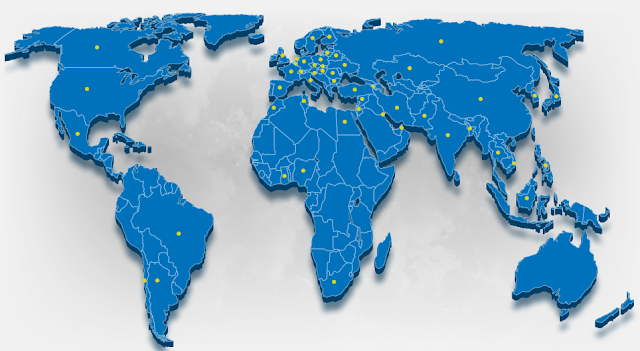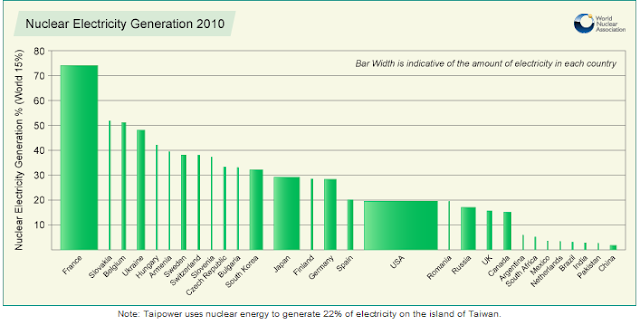Nuclear
power has become very important and critical issue in current world scenario both economically
and politically. It is said to have drastic effects both good and bad for a
country where it will be used for. Surely it will increase the supply of energy and will contribute more to the economic productivity of the
served country. On the other hand, it can have severe environmental and major other issues, which can adversely affect the nation and mankind.
 |
 |
| Countries related to nuclear power |
According
to International Atomic Energy Agency
(IAEA), 29 countries are having operating nuclear power plants and 22
countries had or planning nuclear power up to 2012. As of June 2011, countries
such as Australia, Austria, Denmark, Greece,
Ireland, Italy, Latvia, Liechtenstein, Luxembourg, Malaysia, Malta, New Zealand,
Norway and Portugal remain opposed to nuclear power. France, Belgium and Slovakia uses them as its primary source of
electricity. According to the World
Nuclear Association, Iran, UAE, Turkey, Vietnam, Belarus and Jordan are
having big plans for nuclear power in near future.
India aims to have 20 GWe nuclear capacity by 2020 and 63 GWe by
2032, while at the same time China
aiming to increase capacity to at least 60 GWe by 2020, 200 GWe by 2030 and 400
GWe by 2050.According to a report, the production of worldwide electricity by nuclear power will increase by 23% by low projection and 100% by high projection
by 2030.
Quick facts for nuclear power in world
context:
- The first commercial nuclear power stations started operation in the 1950s.
- There are now over 440 commercial nuclear power reactors operating in 31 countries, with 372,000 MWe of total capacity.
- They provide about 13.5% of the world's electricity as continuous, reliable base-load power, and their efficiency is increasing.
- 56 countries operate a total of about 240 research reactors and a further 180 nuclear reactors power some 150 ships and submarines.
- Today nearly 440 nuclear reactors produce electricity around the world. More than 15 countries rely on nuclear power for 25% or more of their electricity. In Europe and Japan, the nuclear share of electricity is over 30%. In the U.S., nuclear power creates 20% of electricity.
- Around the world, scientists in more than 50 countries use nearly 300 research reactors to investigate nuclear technologies and to produce radioisotopes for medical diagnosis and cancer therapy. Meanwhile, on the world's oceans, nuclear reactors have powered over 400 ships without harm to crews or the environment.
Quick facts for nuclear power in Indian
context:
 |
| Agni Missile,India |
- Nuclear power is the fourth-largest source of electricity in India after thermal, hydroelectric and renewable sources of electricity.
- India is having 4,780 MW nuclear power capacity, which is 3.7% share of the electricity production from all sources as of now.
- As of 2010, India has 20 nuclear reactors in operation in six nuclear power plants, generating 4,780 MW, while 7 other plants are under construction and are expected to generate an additional 2,720 MW.
- India is having totally 20 nuclear reactors operating,7 under construction and 18 planned.
- India plans to increase nuclear power output to 64,000 MW by 2032. It aims to supply 25% of electricity from nuclear power by 2050.
- Six nuclear power plants in India are located in Kaiga in Karnataka, Kakrapar in Gujarat, Kalpakkam in Tamil Nadu, Narora in Uttar Pradesh, Rawatbhata in Rajasthan, Tarapur in Maharashtra.
- India involved in ITER (International Thermonuclear Experimental Reactor), which consists European Union, United States, Japan, China, South Korea, and Russia as other members.
- Indo - US nuclear deal was done on July 18th, 2005, under which India agreed to separate its civil and military nuclear facilities and place all its civil nuclear facilities under International Atomic Energy Agency (IAEA) safeguards and, in exchange, the United States agreed to work toward full civil nuclear cooperation with India.
- India aims to have 20 GWe nuclear capacity by 2020 and 63 GWe by 2032.
Points in favour for usage of
Nuclear power:
- Through Nuclear plants, Global warming can be reduced as there is no release of greenhouse gases (carbon dioxide, methane, ozone, chlorofluorocarbon (CFC)) during nuclear reaction.
- Uranium is obtained from open-cut mines, which is not expensive. And currently, the high reserves of uranium found on Earth, are expected to last for another 100 years.
- Nuclear Energy can be produced in large quantities over short periods of time.
- When compared to the fossil fuel waste, the nuclear waste which occurs due to the production of nuclear power is small in quantity.
- We can save oil and coal reserves which are going to be run out at some point in future.
- Although it releases energy it does not inject any harmful gases like carbon dioxide, sulphur dioxide, carbon monoxide etc that is hazardous to environment.
- Renewable sources of energy such as Solar, Wind & Tidal energy are not viable because of cost, non availability, not being steady or not being sufficient. Since the nuclear fission is the most energy for the lease fuel, this will make power very cheap, reduce the expenditure and will eliminate the shortage of mineral resources.
- Nuclear energy has proved a great boon in the field of Medical sciences. Many diseases which were thought to be fatal, are being treated quite successfully. Radio isotopes are used for various medical operations. Radioactive Cobalt is being employed to cure cancer.
- The contribution of nuclear energy in the food production and irrigation purpose is tremendous. It is used in the production of insecticides and pesticides to control the harmful organisms from invading the production. Radiation, when directed on seeds and plants increases the crop output. Radiation also used to kill harmful bacteria so that foods, onions etc may be kept fit for human use for a longer duration of time. Gamma rays provided a valuable means to control pests.

Points in against of usage of Nuclear power:
- Nuclear plants are dangerous if it explodes. Thousands of people suffered in the nuclear accident happened in Chernobyl in 1986. Recently, on March 11th, 2011, four nuclear reactors exploded in Japan due to earth quake. There are 17 nuclear plant explosions happened in the world till now.
- Nuclear power releases radiation, which causes severe health problems to the people in its surroundings. The radiation released by this, lasts for tens of thousands of years in the environment.
- In Japan, at the place of nuclear reactors which are exploded, high radio activity was found in water, leafy vegetables, sea food, and in the people, who are working for reconstruction of those power plants.
- Terrorists may take advantage of this and may produce nuclear weapons, which is a great risk for entire world.
- Even though it produces small amount of waste, it is highly hazardous and the long-term storage of this waste is too difficult.
- Any atomic conflict on a large scale would result in the complete extinction of human race. The nuclear tests are causing a serious damage to mankind. There is great tension prevailing all over the world.
- Although nuclear energy does not create any pollution, the waste that is released in the air can harm the environment. Being exposed to this radiation can lead to many harmful effects especially for the pregnant woman. Their children may be born with genital defects. The radioactive waste has caused harmful effects to many water bodies and aquatic life.
- Another problem with nuclear power is the disposal of radioactive waste. Due to the extremely long half life of uranium, spent fuel rods stay contaminated for millions of years and no worldwide public accepted plans for storage and disposal for them is available.
There are
eight countries that have successfully detonated nuclear weapons. Five are
considered to be "nuclear-weapon states" (NWS) under the terms
of the Nuclear Non-Proliferation Treaty
(NPT). In order of acquisition of nuclear weapons these are: the United States, Russia, the United
Kingdom, France, and China. Nations that are known or believed to possess
nuclear weapons are sometimes referred to as the nuclear club.
Since the
NPT entered into force in 1970, three states that were not parties to the
Treaty have conducted nuclear tests, namely India, Pakistan, and North Korea. North Korea had been a party to
the NPT but withdrew in 2003. Israel
is also widely believed to have nuclear weapons, though it has refused to
confirm or deny this, and is not known definitively to have conducted a nuclear
test. South Africa has the unique
status of a nation that developed nuclear weapons but has since disassembled
its arsenal before joining the NPT.
 |
| Nuclear power capacity of countries |
North Korea on 12th
of Feb 2013, said it had conducted a “successful” third underground nuclear
test, in a move that brought quick condemnation from the United Nations and the
North’s neighbours and is set to heighten regional tensions. The test was
reported to have taken place at a test site in the North Hamgyeong province,
where the Punggye-ri nuclear complex that conducted tests in 2006 and 2009 is
located. The previous nuclear test in 2009 resulted in fresh resolutions aimed
at the North from the United Nations
Security Council (UNSC), tighter sanctions and increased tensions with South Korea and Japan.
What is your view regarding usage of Nuclear power for electricity in Indian and world context?
What is your view regarding lethal Nuclear weapons in Indian and world context?
Follow @SocioCosmo













0 comments:
Post a Comment
Please note: Comment moderation is enabled and may slightly delay your comment to get finally published. There is no need to resubmit your comment.